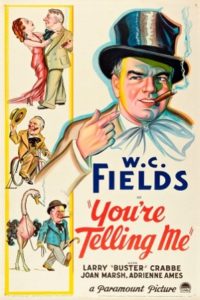It’s a funny ol’ world… Man’s lucky if he gets out of it alive. – W.C. Fields as Sam Brisbee
There are some stars I get and others I always thought I got. But perceptions and appreciations change over time, and there are occasions when I simply can’t appreciate what others see in a much lauded star. Today I need to add W.C. Fields to this last list. In all honesty, my lone knowledge of him are some viewings of My Little Chickadee many years ago.
With that positive image in my head, I hit play on 1934’s You’re Telling Me!, one of his earliest films done while under contract to Paramount. At a crisply short 63 minute run time, I expected good things. When the hour was up, I was a bit stupefied and in light of what seems to be almost universal appreciation for Fields and his comedy, I have to say that the fault for this lack of appreciation must be mine.
You’re Telling Me! puts Fields in one of his typical roles as a hen-pecked husband who toils in abused silence. As Sam Brisbee, he is an optometrist by day but his true love is in being an amateur inventor. During the course of the film we meet three of his inventions: a keyhole device which helps guide a drunkards key to open his front door, a rigged chair which is booby-trapped to knock out anyone who sits in it and most importantly puncture-proof tires.
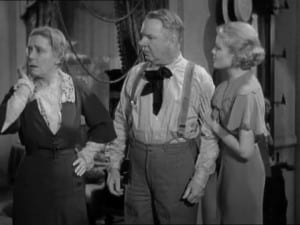 Playing his wife Bessie is Louise Carter and Joan Marsh is his daughter Pauline. As the film opens Bessie confronts a clearly drunk Sam- after he navigates with significant entanglement a maze of hanging drapery pulls. She tells him at varying time what to do with both his shoes and his hat. We’re also introduced to Pauline (Joan Marsh), who is nigh on becoming engaged to Bob (played by Larry Crabbe), the son of one of the snootier families in town. Sadly throughout the movie, Marsh isn’t given much of anything to do except watch the proceedings, which is surprising given that she has second billing and was a bit of a minor star at the time.
Playing his wife Bessie is Louise Carter and Joan Marsh is his daughter Pauline. As the film opens Bessie confronts a clearly drunk Sam- after he navigates with significant entanglement a maze of hanging drapery pulls. She tells him at varying time what to do with both his shoes and his hat. We’re also introduced to Pauline (Joan Marsh), who is nigh on becoming engaged to Bob (played by Larry Crabbe), the son of one of the snootier families in town. Sadly throughout the movie, Marsh isn’t given much of anything to do except watch the proceedings, which is surprising given that she has second billing and was a bit of a minor star at the time.
As you’d imagine, Fields is center stage and in just about every scene of any importance. A letter arrives from a tire company inviting him to demonstrate his wonderful new tires. Only poor Bisbee parks his car- with four puncture-proof tires on it- in a no-parking zone. During introductions with the tire executives upstairs his car is towed and replaced by a police cruiser- an identical model car. Bisbee of course shoots out all four tires of the cruiser and is left alone and embarrassed on the street.
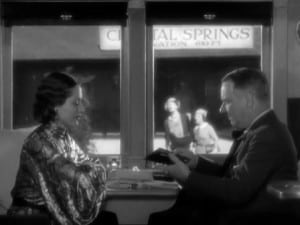 Despondent and ashamed, Bisbee buys a bottle of iodine and a train ticket, with an aim to commit suicide. We witness the poor man unable even to perform this act given constant distractions. More depressed than ever, Bisbee wanders in search of a washroom, but instead finds Princess Lescaboura (Adrienne Ames). However, she doesn’t introduce herself as such, and for the entire picture he thinks her role as a Princess is merely a put-on to help him.
Despondent and ashamed, Bisbee buys a bottle of iodine and a train ticket, with an aim to commit suicide. We witness the poor man unable even to perform this act given constant distractions. More depressed than ever, Bisbee wanders in search of a washroom, but instead finds Princess Lescaboura (Adrienne Ames). However, she doesn’t introduce herself as such, and for the entire picture he thinks her role as a Princess is merely a put-on to help him.
This scene with the Princess is one of the best in the film, and takes Fields’ out of his stereotypical role. Here he plays it relatively straight and shows surprising range: sadly this is the only scene which actually lets him stretch himself a bit.
They become friends and part after a few minutes, with Bisbee rejuvenated and the Princess ready to help rehabilitate him. However, a duo of the local towns’ gossip queens are in the coach outside Lescaboura’s cabin and presume something more nefarious than a simple conversation occurred behind the closed door. On disembarking they share their presumptions with anyone who will listen.
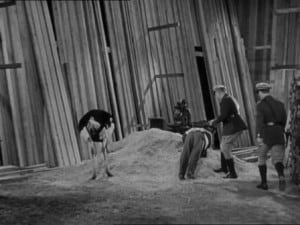 More shamed than ever, Bisbee knows he will need something big to smooth things over with his wife, so he buys an ostrich for her. It’s one of the more humorous portions of the film but lasts only a few moments until both are found by the following police with both of their heads stuck in the sand.
More shamed than ever, Bisbee knows he will need something big to smooth things over with his wife, so he buys an ostrich for her. It’s one of the more humorous portions of the film but lasts only a few moments until both are found by the following police with both of their heads stuck in the sand.
Following up on her promise, the Princess visits with an aim to help Sam. This results in a banquet at the Bisbee home and Sam being granted the opportunity to inaugurate the town’s new golf course by hitting the first ball off the tee. This he finally does, after an extremely overlong bit (previously done better by Fields himself in an earlier production) with his caddy (Tammany Young) and the Princess in attendance.
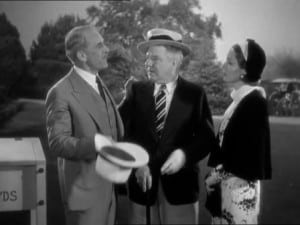 As he tees off, the executives return, having found Bisbee’s actual car and tested his invention themselves. A bidding war between the Princess and the executives ensues, with the tire company finally winning out. Now finally successful and wealthy, Bisbee is now the town patriarch. In wishing the Princess well as she departs, he thanks her for ‘pretending’ to be the Princess to help him out. In response she replies, “You’re Telling Me!”
As he tees off, the executives return, having found Bisbee’s actual car and tested his invention themselves. A bidding war between the Princess and the executives ensues, with the tire company finally winning out. Now finally successful and wealthy, Bisbee is now the town patriarch. In wishing the Princess well as she departs, he thanks her for ‘pretending’ to be the Princess to help him out. In response she replies, “You’re Telling Me!”
Again, shame on this viewer for simply not getting it. Perhaps it is that Fields’ act has aged poorly, but there are few laughs anywhere during the film. Most of the gags- which almost exclusively involve only Fields and none of the supporting cast in any meaningful way- take a mildly humorous situation and drag it on for an eternity.
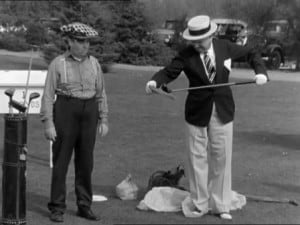 Take as examples Fields’ early bout with the draperies and the ten minute or so golf escapade at the film’s finale. Both are overdone and tedious. Better done are the more concise scenes where Fields’ shoots out the tires and his race with the ostrich.
Take as examples Fields’ early bout with the draperies and the ten minute or so golf escapade at the film’s finale. Both are overdone and tedious. Better done are the more concise scenes where Fields’ shoots out the tires and his race with the ostrich.
Except for the excellent scene where Fields’ meets the Princess (and isn’t played for laughs), he looks unenthused and tired for most of the proceedings, seemingly overly familiar with the material almost to the point of sleepwalking through it. What You’re Telling Me! is missing is a little bit of life and spontaneity. With the focus exclusively on Fields’ the balance of the cast has little to do but nod and help string along the portions of the film between Fields’ set pieces.
Even knowing Fields’ propensities for ad-libbing and filming in varying states of inebriation fails to overcome what at best is a tepid excursion down the avenues of comedy. Nope, I simply don’t get this at all.
